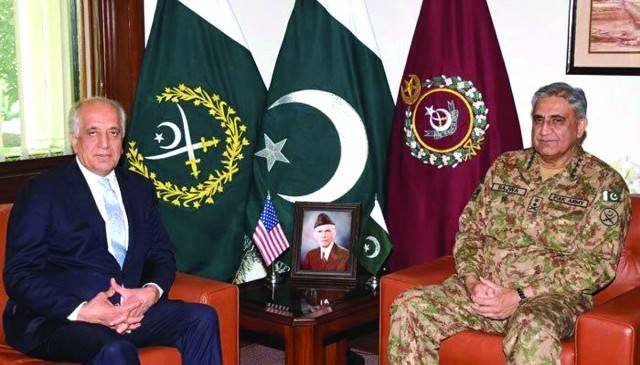
The push for peace in Afghanistan has entered yet another crucial phase with the fast-approaching May 1 deadline for the pullout of the last of 2,500 US troops from Afghanistan under the February 2020 Doha agreement between the US and Taliban during Trump’s administration. This deadline approaches in the context of stalled Afghan peace talks for several months and a new administration in the White House in Washington.
On Monday, Washington’s point man Zalmay Khalilzad drove to the GHQ to meet the army chief instead of the prime minister or the minister for foreign affairs. Earlier, Khalilzad had visited Doha and Kabul and held consultations in India. Apparently Khalilzad briefed the army chief about these meetings.
The flurry of activity and renewed push for peace is based on the Biden administration’s proposed power sharing arrangement between the Afghan government and the Taliban. It outlines a future constitutional and governing arrangement, a road map for a new interim government in Kabul and terms of a permanent ceasefire.
Foreign news agencies that claim to have reviewed the peace plan say that the proposed interim government in Kabul will replace the current one of Ashraf Ghani “until a new constitution is agreed upon and elections are held” while a joint commission will monitor the ceasefire. The national parliament will “either be suspended until after elections or it will be expanded to include Taliban in it.” Further, the Taliban would have to “abandon safe heavens and military ties in neighboring countries,” according to the proposed peace plan.
Washington has also suggested that the UN convene a meeting of the foreign ministers of China, Pakistan, Russia, the US, Iran and India which have stakes in peace in Afghanistan. An agreement among them is seen vital to any future political settlement.
How serious the US is to push its proposed peace plan can be seen from a highly undiplomatic, almost threatening, letter written by US Secretary of State Blinken to President Ashraf Ghani
How serious the US is to push its proposed peace plan can be seen from a highly undiplomatic, almost threatening, letter written by US Secretary of State Blinken to President Ashraf Ghani. Citing the need for a political settlement and urging Ghani to agree to the “interim government,” the letter warns that if it was not done the Taliban would make “rapid territorial gains” soon after the US exited the country that was also under “active consideration.”
Blinken’s letter made it a point to mention that a copy of it had also been sent to chief executive Abdullah Abdullah who came out as the runner up in the hotly contested 2019 elections. The resultant dispute between him and Ghani was resolved only by US intervention. Clearly the message to Ghani was that in case he did not agree, the US will find someone else with a measure of popular backing to own up to it.
Taliban have confirmed that it has received the proposed plan and that it was now under internal discussions of the group. Afghan vice president Amrullah Saleh is reported to have said that only elected representatives of the people could govern Afghanistan and the USA or no other country could make decisions on behalf of the Afghan people. He also emphasized adherence to the Afghan Constitution and the people’s right to vote.
The GHQ’s response articulated by its media wing only said that the meeting “discussed ongoing Afghan reconciliation process, matters of mutual interest and regional security.”
High stake issues are involved, nor the least being about Taliban to “abandon safe havens in neighboring countries.” That Afghanistan has been a victim of proxy wars waged by Taliban of different hues is no longer in doubt. Apart from its centrality to the Afghan peace process, proxy wars and Taliban safe heavens are also central to Pakistan’s tribal districts recently merged in the province of Khyber Pakhtunkhwa. After all the entire population has suffered unimaginable death and destruction for the past several decades.

An issue as important as this requires broad based discussion in Pakistan involving all stakeholders within the country. It is worrying that in this crucial phase the national parliament, the Foreign Office, the provincial assembly of Khyber Pakhtunkhwa and the tribal people appear totally ignored and sidelined and the shots are called only by the GHQ.
Washington’s point man on Afghanistan thought it necessary to brief the GHQ instead of the civilian policy structures in Pakistan. The Foreign Office does not seem to have been handed a copy of the proposed American peace plan. That is why it has been silent and has abandoned the field to others. While all other stakeholders involved in the peace process in the region are led by corresponding civilian structures, in Pakistan it is markedly different. It is not only led by the GHQ, it has even been made a no-go areas for civil, political and parliament combined. This may serve the short-term interests of some but, lacking in transparency and consensus, will not help the cause of long-term interests of regional peace and stability.
The writer is a former senator

